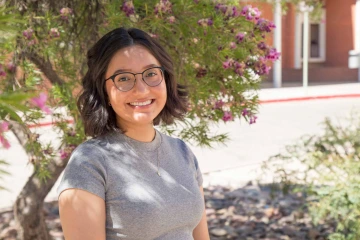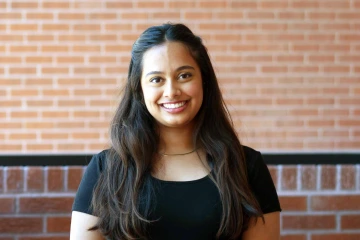White Coat Ceremony marks first step for next generation of physicians
What: White Coat Ceremony for Class of 2028 at the University of Arizona College of Medicine – Tucson
When: Friday, July 26, 5:30-7:30 p.m.
Where: UArizona Centennial Hall, 1020 E. University Blvd., and livestreamed at https://vimeo.com/event/3688824
Event details: https://medicine.arizona.edu/events/medical-student-milestones/white-coat
This week, 120 University of Arizona College of Medicine – Tucson medical students will take part in the annual White Coat Ceremony that serves as a welcome for the Class of 2028. The ceremony will be held July 26 at Centennial Hall from 5:30 to 7:30 p.m. The event recognizes medical students’ entry into medicine with their first physician’s white coats, the garment of their future profession.
“We are thrilled to welcome the Class of 2028 to the College of Medicine – Tucson with the White Coat Ceremony. This event marks the beginning of their journey into our professional community, underscoring the principles they will uphold as medical students and future physicians,” said Kevin Moynahan, MD, the college’s vice dean for medical education and a professor of medicine.

Lizette Castaño is a first-generation college student who has always known she wanted to become a doctor.
Photo by Anna Christensen, University of Arizona College of Medicine – Tucson
“As they don their white coats for the first time, they will start to understand the profound impact they will have on patients’ lives and the communities they will serve. We are proud to support this next class of students as it embarks on this path of compassion, dedication and excellence in health care.”
The white coat ceremony is considered a rite of passage in most U.S. medical schools. The Arnold P. Gold Foundation established the first white coat ceremony in 1993 at Columbia University in New York. The first U of A College of Medicine – Tucson white coat event was held in 1995, and it has been a tradition for incoming medical students since.
Guest Speaker
The featured speaker is Jewel M. Kling, MD, MPH, professor of medicine, chair of the Division of Women’s Health Internal Medicine, assistant director of the Mayo Clinic Women’s Health Center and the dean of the Mayo Clinic Alix School of Medicine – Arizona campus. Kling earned her medical degree from the College of Medicine – Tucson and completed an internal medicine residency at the Mayo School of Graduate Medical Education in Phoenix. Her research is focused on menopause, sexual health, LGBTQ+ care, and the advancement of sex and gender-specific medicine. She is recognized as an institutional and national expert in menopause. She frequently speaks at national meetings on menopause and hormone therapy and has published extensively in the field.
Class of 2028
The Class of 2028 is 54% women, 40% men and 1% trans men, with 5% choosing not to report. The students range in age from 21 to 37. Of the 120 students, 83 are from Arizona, 31 are from Tucson and 19% are first-generation college students. Below are a few of the students who will be participating in Friday’s event:
Lizette Castaño: ‘With perseverance and resilience, anything is possible’
Tucson native Lizette Castaño was inspired by early childhood experiences and knew she wanted to be a doctor since she was 7 years old.
“There were many family losses that led me toward this path. My grandfather passed away suddenly, and a few years later, I lost an aunt and an uncle,” she recalled. “My pediatrician also encouraged me at every visit to aspire to become a physician.”

Esha Rajadhyaksha’s journey to medical school included the Honors Early Assurance Program, which included an immersive summer research program with a College of Medicine – Tucson mentor.
Photo by Sean O’Sullivan, University of Arizona College of Medicine – Tucson
After starting at BASIS Tucson North, she transferred to BASIS Chandler. A scholarship to Seattle University helped Castaño become the first in her family to attend college, and now she will be the first to become a physician.
“Being a first-gen college student is proof that no matter where or who we come from, we are able to do anything,” she said. “Despite all the obstacles that have been thrown at me, with perseverance and resilience, anything is possible.”
With an undergraduate degree in cellular and molecular biology under her belt, Castaño enrolled in P-MAP, an intensive medical school preparation program for promising students who have faced considerable obstacles. In addition to preparing to complete a master’s degree through the program, she benefited from other aspects of P-MAP.
“We were able to take human gross anatomy, learn how to do a physical exam and take a patient history, hone study skills, and make connections with faculty members,” she said.
For Castaño, medical school is a continuation of her lifelong love of learning.
“From a young age, I loved going to school,” she said. “Being in med school and being able to study full time is a blessing.”
Esha Rajadhyaksha: ‘Eager to learn more’
Chandler native Esha Rajadhyaksha grew up around medical professionals – her parents are dentists – and knew she wanted to work in health careher whole life. Her parents are immigrants and she is the oldest of her siblings, making her the first in her family to go to college in the United States.
“It is so meaningful to be able to take the opportunity my parents have given me – all that hard work they’ve put into their life – and enter medical school to become a doctor,” she shared.
Rajadhyaksha’s journey to medical school started at the University of Arizona, where she earned a bachelor’s degree with dual majors in biology and physiology and medical sciences. Her physiology classes reaffirmed her choice to enter the medical field.
“As I took those classes, I realized I really do love this field, and I want to continue to study it in depth,” she remembered. “Physiology definitely helped me solidify that choice and kept me engaged in the field of medicine and eager to learn more.”
She was looking forward to attending medical school so much that she applied to the Honors Early Assurance Program, which allows participants to apply to the college of Medicine – Tucson during their junior year. Now, as she gets ready to start her next chapter, she is excited to honor her family’s hard work by becoming a physician.
“They are very proud of me, and I’m proud to make them proud as I continue this path,” she said.
Sebastian Beller: ‘Inspired by learning to serve others’
“The idea of constant learning excites me. That’s what I want my life to be: wake up each day; learn something new; apply it day in and day out, and continue that for years to come,” Sebastian Beller said.

Sebastian Beller volunteered with Clinica Amistad during his undergraduate studies at the University of Arizona.
Photo by Anna Christensen, University of Arizona College of Medicine – Tucson
Beller’s nomadic childhood due to his mother’s military service exposed him to diverse populations and environments, where he observed many forms of poverty and inequality across the country.
During his mother’s military deployments, Beller stayed with his grandfather, who worked in a pathology lab in Phoenix. Shadowing him in the lab sparked Beller’s fascination with medicine, and he came to view it as a solution to societal issues.
“I think it’s important to address the problems directly in front of us, but also to tackle the upstream causes so we don’t continue to see the same issues,” Beller said.
As an undergrad majoring in microbiology at the University of Arizona, Beller discovered a passion for working with underserved communities during his time at Clinica Amistad, a Tucson-based health clinic. There, he helped Latino and Native American people manage prediabetes symptoms.
As he begins medical school, Beller is keeping an open mind but envisions a career in medicine and research. He hopes to specialize in a field that will keep him on his feet and require a broad knowledge base. He is contemplating a future in rural family and community medicine, emergency medicine or general surgery.
See full student profiles: https://medicine.arizona.edu/news/2024/white-coat-ceremony-marks-first-step-next-generation-physicians.
Contacts
Sean O’Sullivan
College of Medicine – Tucson
520-626-4520, sosull@arizona.edu
Anna Christensen
College of Medicine – Tucson
520-626-9964, achristensen@arizona.edu

